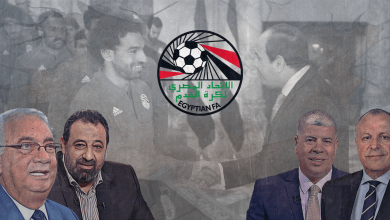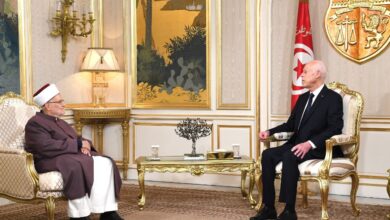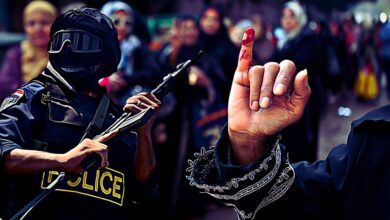Struct. Imbalance in Egypt’s Football ASSN Mechanisms

Click here to read the text in PDF format.
There are many problems facing the Egyptian Football Association (EFA), particularly those related to the mechanisms of choosing its boards.
Although the mechanism adopted by FIFA is to choose boards through election, the Egyptian government keeps interfering in the work of the football association and sometimes dismisses its boards or forces them to resign against the backdrop of any crisis or failure in order to pacify the public opinion.
Also, the EFA faces accusations of bribery, corruption and conflict of interest, as well as the role of the State in politicizing its mission.
Following is a review of this structural imbalance in the mechanisms of the Egyptian Football Association:
First: mechanism of selection of Egyptian Football Association board
One of the important dilemmas associated with the selection of the members of the Football Association’s board of directors is that it comes through direct election from the General Assembly that represents 222 Egyptian sporting clubs across the country, where 112 members are required to complete the quorum (50% +1).
But there are several problems regarding the electoral process, including:
1- Absence of competition
Commenting on the 2012 elections that Gamal Allam won, Samir Zaher, a former EFA president, stressed that there was no election, adding, “There was only one list to vote on.” Hany Abou Rida, who was disqualified from running because he had exhausted the two terms allowed to remain as EFA president, was able to put a low-profile figure, Gamal Allam, on top of his list and supported him for winning the election as EFA president. If we look at the list led by Gamal Allam, we find that it is almost the same list of Hany Abou Rida in the 2016 elections with a few minor changes.
2- Monopolizing the position of EFA President
Since Abdel Monem Emara, former Minister of Youth and Sports, appointed Major General Youssef Dahshoury Harb as president of the Egyptian Football Association in 1992, the EFA has been controlled by only three persons, namely, Major General Youssef Dahshoury Harb, Colonel Samir Zaher (a former army officer), and Eng. Hany Abou Rida. The three men have had influence and control over EFA for most of the last 30 years and were re-elected more than once. Also, Samir Zaher was member of parliament (1995-2000) at the time when he was EFA president (1996-1999). Anyway, the EFA president is always elected in coordination and with direct support from the State represented by the Ministry of Youth and Sports.
3- Electoral bribes
The phenomenon of electoral bribes is a prevailing phenomenon in the Egyptian sports arena. Following are important testimonies on electoral bribery:
– Dr. Kamal Darwish, former president of Zamalek club and former candidate for the post of EFA president, said that he opted to keep away from the sports field and devote full time to his academic work due to the spread of the phenomenon of electoral bribes in the EFA elections.
– Ahmed Shubeir, former EFA vice-president indicated provision of bribes in the EFA elections in 2012 (up to LE 15,000) and that this was done publicly.
– Medhat Shalaby, a former police officer and TV presenter specializing in football, confirmed that he has been aware of what happens in EFA elections and how heads of sporting clubs are bribed to vote for a particular candidate in EFA board election.
Second: Financial and moral corruption
There are cases of financial and moral corruption that have afflicted members of the current EFA board of directors as well as former boards under Samir Zaher and Gamal Allam, including:
1- Imprisonment of Hazem Al-Hawari and Sahar El-Hawari
In April 2017, the Alexandria Economic Court sentenced Sahar El-Hawari and her brother Hazem El-Hawari, both members of the Egyptian Football Association’s board, to five years in prison over charges of falsely declaring bankruptcy to evade paying EGP 238 million in debt to the Alexandria Steel Company, as well as illegally obtaining three loans from the Bank of Cairo in collusion with a bank official.
2- Bribing TTFA President
Former EFA Vice President Ahmed Shubeir admitted that Egypt provided a bribe to Trinidad and Tobago Football Association (TTFA) President Jacques Warner, amounting to $ 180,000, which was much lower than the amounts provided to Warner from South Africa and Morocco, and that he had repeatedly warned against such actions.
3- Attacking the Algerian football team’s bus in 2009
Former Egyptian national team goalkeeper Mohamed Abdel Monsef confirmed that the then president of the Egyptian Football Association, Samir Zaher, hired a group of thugs and incited them to throw stones at the bus of the Algerian national football team after leaving the airport on way to hotel, where three players were injured. Hany Abou Rida also said that what happened at that time was a premeditated scenario and that the attack on the bus was coordinated between the Egyptian Football Association and other elements, adding that what happened to the Algerian team was a great moral disaster.
4- Omdurman Incident
Ahmed Shubeir confirmed that there was no attack on Egyptian artists in the Omdurman football match (between Egypt and Algeria), and that the allegations made by the Egyptian artists were lies, adding that no one of the 4,000 Egyptian fans was injured. Shubeir also stressed that he was forced by security services to change his testimony on the events. The Sudanese security services also confirmed that the allegations of Mohamed Fouad, an Egyptian singer, that he and Egyptian fans were besieged and attacked by Algerian fans, with the injury of 130 Egyptians – all these allegations were false, but Sudan did not take any action against him in order to maintain relations with Egypt.
Third: Overlapping interests
1- EFA positions bequeathed
There is a line of families permanently existing in the Egyptian Football Association boards. For example, Hamada Imam was EFA Vice-President (2000 to 2004) and his wife, Dr. Maggie Halawani, was appointed as member of the 2008 EFA board. Also, Hazem Imam was a member of the resigning EFA board, which quit in the immediate aftermath of Egypt’s exit from this year’s Africa Cup of Nations, which the country hosted.
Seif Zaher, also a member of the outgoing EFA board, is the nephew of Samir Zaher, the former EFA president.
Sahar El-Hawari and Hazem El-Hawari have been recurring members of most EFA boards since 1995.
Khaled Latif, member of the outgoing EFA board, is the grandson of Mohamed Latif, the renowned football commentator.
2- Double tasks and interests
It is remarkable that members of the Egyptian Football Association board are part-time contributors as they have other jobs and tasks, whether working in the media or being members of parliament.
Ahmad Shubeir, Hazem Imam, Seif Zaher, Khaled Latif, Magdi Abdel Ghani work in the field of media and control sports programs. Also, the EFA strong men over the last 20 years, Samir Zaher, Ahmed Shubeir, and Hany Abou Rida, were former members of the dissolved National Democratic Party and former members of the People’s Assembly (parliament).
Some of the EFA board members have worked in ads such as Magdi Abdel Ghani, who did not stop presenting ads during the entire period of his EAF board membership, as well as Hazem Imam and Seif Zaher.
Fourth: politicization of EFA boards
The activity of the Egyptian Football Association was never far from the political promotion of the Mubarak and Sisi regimes, where the Mubarak regime used the successes of the Egyptian national football team to promote the policies targeting Gamal Mubarak’s power succession.
Also, the EFA board members have played a political role in promoting the policies of the current regime, which is considered a departure from the civil and social nature of the Football Association, and turning the EFA to a political supporter of the regime, playing the role of a political party in promoting the policies of the government.
For example, Tharwat Sweilam, executive director of the Egyptian Football Association, announced that Ahmed Shubeir, EFA vice president, Hazem Imam and Seif Zaher, EFA board members, would participate in a sports conference in Sharkiya governorate to promote the constitutional amendments, proposed by the regime.
The Egyptian Football Association organized a rally to support Sisi in the January 2018 presidential election and invited all football prominent figures to attend the rally. Thus, it is clear that politicization of the EFA to serve the regime is not limited to the behavior of its board members, but it also includes the EFA as an organization that does not hesitate to show political support for the regime and promote its policies.
Dismissal of EFA boards
Another phenomenon associated with the politicization of the Egyptian Football Association is the repeated dismissal of EFA boards although the EFA operates according to FIFA regulations, where the State should not interfere in its work or dismiss its board as a non-governmental entity. Despite the political function played by successive EFA boards to support the regime from Mubarak to Sisi, the regime dismissed many EFA boards and appointed new ones, especially after failure of football teams, to pacify the public opinion.
Conclusion
Football in Egypt remains a victim of politicization, a phenomenon that is not likely to end soon as long as the political system deliberately seeks to use football to distract people through fabrication of fictitious issues, arousing intrigue among the fans of different clubs, and keenness on presence and intervention in all sports events. A recent statement by General Abdel Fattah Al-Sisi that the coach of the national team will be Egyptian is considered an explicit intervention in the sports affairs and an infringement on the competencies of the Egyptian Football Association, which is supposed to run football affairs independently.
In addition to the need for independence from the political sphere, the Egyptian Football Association must run the football affairs professionally, be keen on not giving up to the pressures and threats of major sporting clubs such as Ahli and Zamalek, apply regulations strictly, and avoid appeasing the public by violating its regulations[1].
*To read the full study in Arabic click here
[1] The views expressed in this article are entirely those of the author’s and do not necessarily reflect the views of EIPSS.
Click here to read the text in PDF format.



